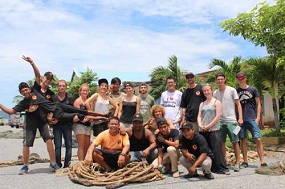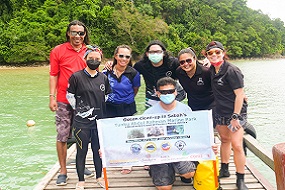News

- HOME
- News
- News
| Title | [Green Asia] Asia-Pacific Marine Ecosystem Protection Project (Green Asia Grant) | 2021-12-28 |
|---|---|---|
|
  Marine Research Foundation (MRF) Marine Conservation Cambodia(MCC)
“Asia-Pacific Marine Ecosystem Protection Project" 1. MRF’s coral reef protection and restoration project in Sabah, Malaysia Have you ever heard of the crown-of-thorns starfish? The crown-of-thorns starfish is called the “pirate of the ocean” since it has poison on its spikes. The crown-of-thorns starfish, which mainly feeds on coral reefs, reproduces rapidly due to the recent abnormal climate, which is affecting the decline of the coral reef population. Marine Research Foundation (MRF), a marine ecosystem conservation NGO from Malaysia, is working hard to restore coral reef ecosystems by using divers to collect crown-of-thorns starfish and waste nets off the coast of Sabah, Malaysia. In September, a total of 300 crown-of-thorns starfish were collected.
2. Marine life protection, coastal life resource conservation, and trolling prevention structure support project in the Kep region of Cambodia by MCC In 2008, to protect the marine ecosystem and coastal life resources, Cambodia designated a marine fisheries control zone and is carrying out various activities to prevent illegal fishing. Marine Conservation Cambodia(MCC) is one of the maritime NGOs and working to designate and protect marine fisheries control zones. The designated marine fisheries control zone is home to marine lives including coral reefs and mangroves, so it plays a unique role as blue carbon. Recently, as the number of illegal fishing and fishing using electric nets has increased, marine habitats have been seriously destroyed. In response to this problem, MCC has built and installed about 300 anti-trolling structures using eco-friendly materials. The structure prevents illegal fishing in shallow waters that damages the seafloor. It is also installed in the form of artificial reef habitats, which themselves serve as a habitat for living things. Looking forward to clean Cambodian seas, free of illegal fishing and electric net fishing.
3. Marine Ecosystem Protection Activities in Palawan Island, Philippines by LAMAVE Palawan Island in the Philippines is home to whale sharks and giant manta rays, which have been classified as endangered species on the Red List by the International Union for Conservation of Nature (IUCN). The Philippines should make efforts to protect endangered species on its own, but unfortunately, awareness of environmental protection and the establishment of the system are insufficient. Large Marine Vertebrates Research Institute Philippines (LAMAVE) monitors whale shark and giant manta ray populations and assigns identification numbers to individuals to check their health status. In particular, as both whale sharks and giant manta rays have unique patterns and shapes, they are carefully observed and investigated to distinguish individuals. The research contents will be used as basic data for establishing local community systems in the future, and LAMAV plans to conduct endangered species protection education for local residents next year.
|
||
About us
Tel. 82-2-2011-4300 | Fax. 82-2-725-4840 | E-mail. greenfund@greenfund.org
Copyright(c)2016 GREENFUND. all rights reserved








